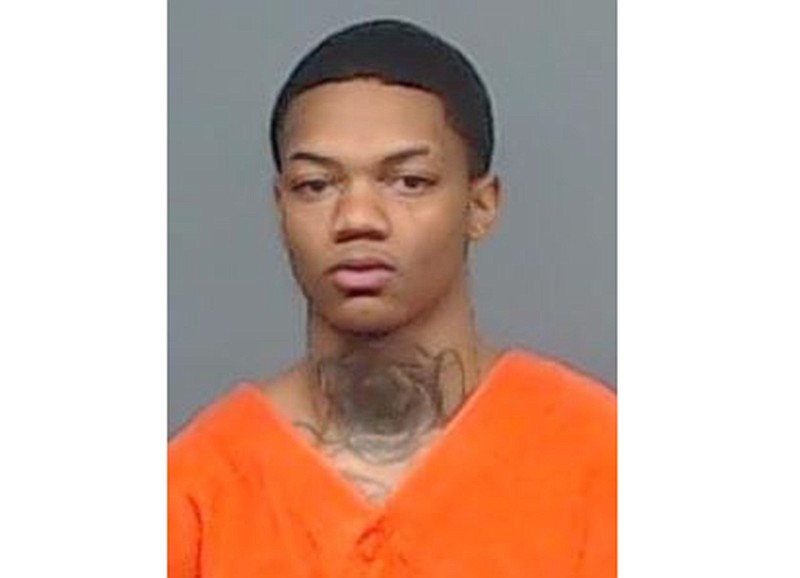NEW BOSTON, Texas - A second day of testimony is expected to begin today in the jury trial of a Texarkana man accused in the January 2020 death of his girlfriend.
Dontavious Dishawn Haney, 21, faces five to 99 years or life in prison if found guilty of aggravated assault, family violence, causing serious bodily injury with a deadly weapon. Haney's fist is the deadly weapon prosecutors allege caused a fatal head injury to Denise Watson on the morning of Jan. 24, 2020.
"This is really not a who-done-it case," Assistant Public Defender Clayton Haas told the jury in his opening statement Wednesday morning.
Haas said he expects the jury to grapple with whether Haney acted "intentionally, knowingly or recklessly."
Witnesses testified that Haney and Watson, 21, were living together with a family friend and Watson's seriously ill mother in an apartment in the 1600 block of Peach Street in Texarkana, Texas, at the time of Watson's death. Sheneka Shavers, who lived in the apartment next door and whose unit shared a wall with the apartment where Haney and Watson lived, testified about the morning of Jan. 24, 2020.
Shavers said she heard Watson crying at about 8 a.m, under questioning from First Assistant District Attorney Kelley Crisp.
"She said, 'It hurts, it hurts. I want my mama, I want my mama," Shavers testified.
Shavers said nobody came to the door when she knocked.
Shavers said an hour and a half later, she saw that an ambulance and police had arrived. Shavers told the jury she had "intervened" in disputes between Haney and Watson before and that she had seen Watson with bruises and scratches previously.
Texarkana, Texas, Police Officer Ben Thompson testified under questioning by Assistant District Attorney Lauren Richards that when he arrived at approximately 9:30 a.m., Watson was lying nude on the living room floor and Haney was on the phone with an emergency dispatcher. Thompson said Haney initially told him that Watson had a heart condition but he later learned that Haney told a dispatcher he had "touched" Watson.
The jury watched body camera video of Haney and Thompson speaking outside the apartment. In the video, Haney claims that he punched Watson in the eye after she knocked his phone out of his hand. Haney claimed he "reflexively" hit Watson in the face.
The jury also watched body cam footage recorded by Officer Lauren Lynch.
In the video, Lynch points out that Haney has cuts and scratches on the knuckles of both his right and left hands. Haney responded by telling the officers that he punched a wall in Watson's children's bedroom.
Crime Scene Analyst Spencer Price testified that he located a hole in a wall in the children's bedroom though it was low to the floor and behind the door.
"It was about at my knee," Price said.
Price said he did not collect a large amount of evidence from the apartment and that no items were sent for DNA testing.
"This was a major case with a minor crime scene," Price testified.
Watson died the following day.
Texarkana neurosurgeon Marc Smith testified that he was surprised at the amount of swelling in Watson's brain given the timeline he was provided for when emergency help was summoned. Smith said he believes Watson had been "down" for some time, struggling to breathe, before help was called.
Smith said scans showed Watson suffered a "blow-out fracture" to her left eye and fractures to her nasal cavity.
As Richards questioned Medical Examiner Grant Herndon, Haney began to sob loudly at the defense table. The jury was escorted out of the courtroom under instruction from 202nd District Judge John Tidwell and Haney was later admonished to refrain from future outbursts.
Herndon testified that Watson suffered severe swelling on one side of her brain which deprived the brain of oxygen. Herndon told the jury he asked a neuropathologist to examine Watson's damaged brain.
Herndon explained that the injury to Watson's brain caused "acute neuronal necrosis. The neurons are dying. The brain is dying."
Herndon said a combination of being punched in the face and thrown into a wall could have caused Watson's injuries and replied, "Yes, they can," when asked if hands and fists can be deadly weapons.
Under cross examination,Assistant Public Defender Bart Craytor, asked Herndon questions regarding whether Haney could have struck Watson defensively or reflexively. While the jury was on a break, Crisp argued that Craytor's questions opened the door for the state to put on testimony regarding Haney's alleged history of physical violence toward Watson.
Shavers took the stand a second time and testified that she called police on Christmas Day 2019 after she heard Haney hit Watson with a beer bottle. Craytor asked Shavers a question about Watson under cross-examination which led Crisp and Richards to object and Tidwell to abruptly place the jury in an evening recess.
The prosecutors argued that Craytor's question violated a prior ruling from the court. Tidwell instructed the lawyers to be in court earlier than the jurors to discuss the matter.
The jury is expected to continue to hear testimony Thursday. If convicted, Haney faces five to 99 years or life in a Texas prison.

